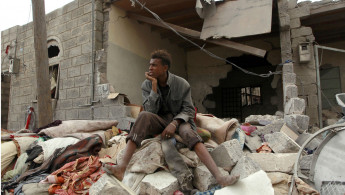MSF: Yemen war 'worst we've experienced'
When an organisation like Doctors Without Borders, who have worked in warzones across the world for decades, say that the war in Yemen is one of the most destructive they have ever seen, it may be time to pay attention.
The organisation, also known as Medecins Sans Frontieres (MSF) has been on the ground in Yemen for a number of years, working across the country to provide for those in need in the Middle East's poorest country.
| What shocked me was the number of war-wounded patients in hospital with very complex injuries, it was total carnage - Dr Joanne Liu, MSF |
But now, with a conflict between local forces that has been going on for months and became more intractable with the beginning of Saudi-led coalition airstrikes in March, even MSF is shocked.
Speaking over the phone from Djibouti after spending two weeks visiting MSF projects in some of Yemen's most war-riven areas, the organisation's international president, Dr Joanne Liu, is clearly distressed from what she has seen in the country.
“What shocked me was the number of war-wounded patients in hospital with very complex injuries, it was total carnage,” Liu said.
Liu has worked for MSF for 20 years, during which she has worked in and visited some of the world's worst conflict-zones, including Palestine, Darfur, Syria and the Central African Republic. Yet in none of those areas have MSF received the number of war-wounded patients as they have now in Yemen.
“I've never seen such a high number of war-wounded patients with really awfully graphic and complicated war wounds... we're close to 9,000 in less than four months. This is a record number of war-wounded in a conflict for MSF that we have taken care of, it's highly traumatising,” she said.
Liu added that because of the nature of MSF's facilities in Yemen, and the general medical facilities available in the country, they have struggled to deal with many of the patients they receive, because of the nature of their injuries and the care that they need.
“This has been a very, very violent conflict,” Liu said. “We can do the first phase surgery, but some patients need re-constructive surgery... right now these kind of facilities do not exist in the country.”
It is not just the airstrikes and the shelling that are contributing to the suffering of the Yemeni civilians, but the snipers who picked out people in the streets in Aden - and still continue to do so in Taiz - as well as the blockade that is preventing goods and medicine from reaching people.
“There is an increasing trend of civilians being targeted, there are airstrikes and shelling in densely-populated civilian areas,” said Liu.
“We also have to denounce the blockade; in addition to the basic goods that are no longer flowing into the country, there is no more medicine coming in, so right now we are starting to have shortages of vital medicine... and people are starting to die.”
The civilians, and MSF's staff alike, are having to live the war – one that has shown it can strike combatants and non-combatants alike.
“There is no night where there are no airstrikes or anti-aircraft shelling,” said Liu. “It's living in a world of uncertainty, it's living each day not knowing what the next day will bring.”



